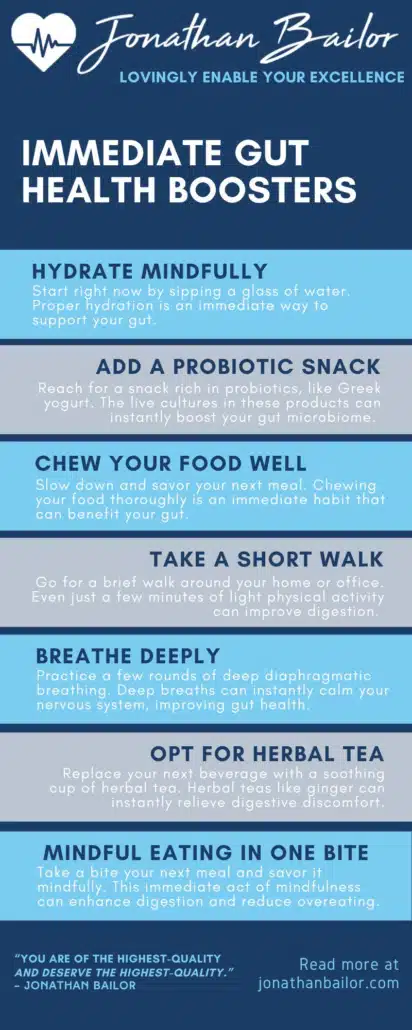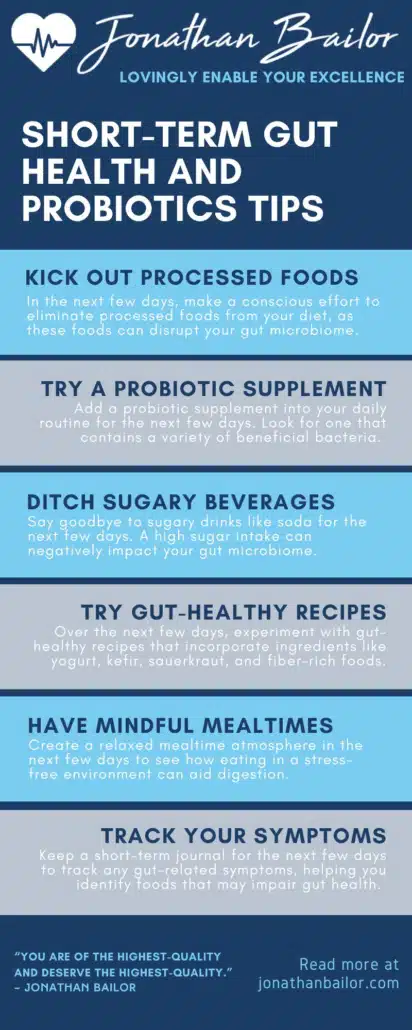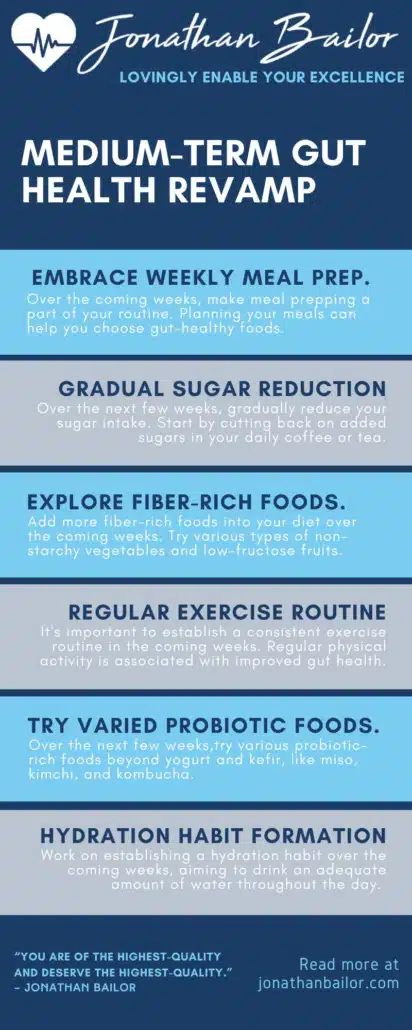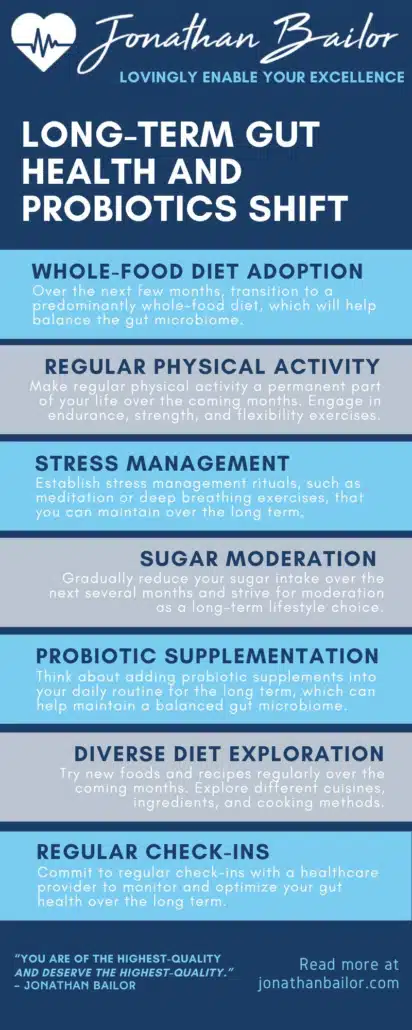26 Habits to Improve Gut Health with Probiotics at Every Stage of Life
Here are 26 habits to improve gut health with probiotics at every stage of life in this Gut Health article with Jonathan Bailor! Welcome to a transformative journey designed to empower you at every life stage to take control of your gut health.
This exploration is about improving gut health using the remarkable potential of probiotics. The spotlight is on probiotics because gut health plays a pivotal role in overall well-being. Probiotics, the friendly bacteria, are the unsung heroes in this journey, actively shaping the gut’s health landscape.
Get a healthier gut with our 24 Ways to Boost Gut Health with Probiotics and 28 Proven Ways to Boost the Effects of Probiotics for Gut Health guides next!
The focus isn’t just on insights but practical and actionable habits, offering a holistic approach to support gut health. The beauty of these habits is that they’re accessible to everyone, providing a reliable path toward better health.
Throughout this blog post, you will discover 26 habits tailored to your unique life stages. These habits encompass dietary choices, daily routines, and wellness practices. Each habit is grounded in medical accuracy and designed to enhance gut health.
The goal is not only self-improvement but also the well-being of loved ones. It’s important to improve our own well-being as well as that of our loved ones. We highly recommend sharing this valuable information with others. By spreading knowledge and implementing these habits, we can all contribute to creating a healthier world with vibrant gut health at the center of it all.
Immediate Gut Health Boosters: Simple Changes to Support Probiotics for Instant Well-Being
1. Hydrate Mindfully
Start right now by sipping a glass of water. Proper hydration is an immediate way to support your gut. Water helps maintain the mucous lining of your intestines, acting as a protective barrier against harmful bacteria. It also aids digestion and keeps things moving smoothly through your digestive tract. So, take a moment to hydrate and set the stage for better gut health.
2. Add a Probiotic Snack
Reach for a snack rich in probiotics. Greek yogurt or kefir are excellent choices. The live cultures in these dairy products can instantly boost your gut microbiome. Enjoying a small serving as a snack is a tasty and convenient way to introduce friendly bacteria into your system.
3. Chew Your Food Thoroughly
Slow down and savor your next meal. Chewing your food thoroughly is an immediate habit that can benefit your gut. Properly chewed food is easier for your digestive system to process, reducing the risk of indigestion and discomfort. Plus, it allows your body to absorb nutrients more efficiently.
4. Take a Short Walk
Go for a brief walk around your home or office. Even just a few minutes of light physical activity can stimulate blood flow to your digestive organs, promoting better digestion. This simple habit can help alleviate that post-meal sluggishness and enhance your gut’s function.
5. Breathe Deeply
Practice a few rounds of deep diaphragmatic breathing. Deep breaths can instantly calm your nervous system, which has a direct impact on your gut health. By reducing stress, you create a more favorable environment for your gut microbiome, including probiotics, to thrive. Inhale deeply through your nose, filling your lungs, and exhale slowly through your mouth to feel an immediate sense of relaxation.
6. Opt for Herbal Tea
Replace your next beverage with a soothing cup of herbal tea. Herbal teas like peppermint, ginger, or chamomile can provide immediate relief from digestive discomfort. These herbal remedies can help alleviate gas, bloating, and indigestion, making them an excellent choice for instant gut comfort.
7. Mindful Eating in One Bite
Take one bite of your next meal and savor it mindfully. Pay attention to the taste, texture, and aroma of the food. This immediate act of mindfulness can enhance your digestion and reduce overeating. By being fully present during your meal, you set the tone for better gut health, one bite at a time.
These immediate changes are small steps that can significantly improve your gut health. Incorporate them into your routine whenever you can, and remember that consistent efforts over time contribute to lasting well-being.

Feeling Better Is Priceless, That's Why We Don't Put A Price On It!
“It’s Like A Free and Medically Valid Version of Noom and Weight Watchers Online”
~ Dr. Doctor Matthew Oleshiak, MD
Click the 'LEARN MORE' button below for free lifetime access to the fast fix program developed by Jonathan and top Ivy League Medical Doctors
LEARN MOREP.S. It's not a free trial. It's not part of the program for free. The entire program is free, forever, for real! No credit card needed.
Short-Term Gut Health and Probiotics Strategies: Quick Fixes for Days Ahead
1. Kick Out Processed Foods
In the next few days, make a conscious effort to eliminate processed foods from your diet. These items are often loaded with artificial additives and preservatives that can disrupt your gut microbiome. Instead, focus on whole, unprocessed foods like fruits, vegetables, lean proteins, and legumes to give your gut a break from processed junk.
2. Try a Probiotic Supplement
Consider incorporating a probiotic supplement into your daily routine for the next few days. Look for one that contains a variety of beneficial bacterial strains. This short-term addition can provide an extra dose of friendly bacteria to support your gut health.
3. Ditch Sugary Beverages
Say goodbye to sugary drinks like soda and fruit juices for the next few days. A high sugar intake can negatively impact your gut microbiome. Opt for water, herbal tea, or unsweetened beverages to help create a more gut-friendly environment.
4. Explore Gut-Healthy Recipes
Over the next few days, experiment with gut-healthy recipes that incorporate ingredients like yogurt, kefir, sauerkraut, and fiber-rich foods. These recipes can diversify your diet and introduce more probiotics and prebiotics to nurture your gut microbiome.
5. Mindful Mealtime Atmosphere
Create a relaxed mealtime atmosphere over the next few days. Set aside distractions like TV and phones and focus on enjoying your food. Eating in a stress-free environment can enhance digestion and promote gut comfort.
6. Track Your Symptoms
Keep a short-term journal for the next few days to track any gut-related symptoms or discomfort. This self-awareness can help you identify foods or habits that may negatively affect your gut. With this information, you can make educated decisions to support your gut health in the short and long term.
These short-term changes are quick fixes that can jumpstart your journey to better gut health. While they may not bring instant results, incorporating them into your routine for the next few days can set the stage for more significant improvements in the medium and long term.

Medium-Term Gut Health Revamp: Transformations in Weeks Ahead to Support Probiotics
1. Embrace Weekly Meal Prep.
Over the coming weeks, make meal prepping a part of your routine. Planning and preparing your meals in advance can help you choose gut-healthy ingredients and avoid last-minute, less nutritious choices. By taking control of your food choices, you can positively impact your gut health in the medium term.
2. Gradual Sugar Reduction
Over the next few weeks, gradually reduce your sugar intake. Start by cutting back on added sugars in your daily coffee or tea. Then, explore sugar alternatives like stevia or monk fruit. This medium-term approach can help recalibrate your taste buds and reduce the negative impact of excessive sugar on your gut.
3. Fiber-Rich Food Exploration
Incorporate more fiber-rich foods into your diet over the coming weeks. Experiment with different types of non-starchy vegetables, legumes, and low-fructose fruits to diversify your fiber intake. Fiber supports a healthy gut microbiome and aids digestion, making it a crucial medium-term dietary change.
4. Regular Exercise Routine
It’s important to establish a consistent exercise routine in the coming weeks. Regular physical activity is associated with improved gut health. Start with achievable goals and gradually increase your activity level. Whether it’s daily walks, yoga, or dancing, find an activity you enjoy to support your gut health in the medium term.
5. Try Different Probiotic Foods
Over the next few weeks, explore a variety of probiotic-rich foods beyond yogurt and kefir. Fermented foods like kimchi, miso, and kombucha offer different strains of beneficial bacteria that can diversify your gut microbiome. Incorporating these options can positively impact your gut health over the medium term.
6. Hydration Habit Formation
Work on establishing a hydration habit over the coming weeks. Aim to consistently drink an adequate amount of water throughout the day. Staying well-hydrated supports healthy digestion and a thriving gut microbiome, making it a valuable medium-term change.
These medium-term transformations are steps you can take over the coming weeks to revamp your gut health. While they require a bit more time and commitment, their cumulative effect can set the stage for long-term improvements in your well-being.

Long-Term Gut Health and Probiotics Transformation: Sustainable Changes Over Month
1. Whole-Food Diet Adoption
Over the next few months, transition to a predominantly whole-food diet. Focus on fresh fruits, nonstarchy vegetables, lean proteins, low-sugar fruits, and healthy fats. This long-term dietary change ensures a consistent intake of essential nutrients and fiber, fostering a balanced gut microbiome.
2. Regular Physical Activity
Make regular physical activity a permanent part of your life over the coming months. Engage in a mix of endurance, strength, and flexibility exercises tailored to your preferences and abilities. A long-term commitment to exercise supports gut health and contributes to overall well-being.
3. Stress Management Rituals
Establish stress management rituals that you can maintain over the long term. Whether it’s daily meditation, deep breathing exercises, or mindfulness practices, these habits can help keep stress levels in check. Chronic stress can negatively impact gut health, so consistent stress management is vital.
4. Sugar Moderation as a Lifestyle
Gradually reduce your sugar intake over the next several months, and strive for moderation as a long-term lifestyle choice. This includes limiting sugary beverages, processed snacks, and desserts. By making sugar moderation a permanent habit, you can protect your gut health and overall health.
5. Probiotic Supplementation
Think about adding probiotic supplements to your daily routine for the long term. Consult a healthcare professional to select the most suitable probiotic strains based on your unique needs. Long-term probiotic use can maintain a balanced gut microbiome.
6. Diverse Diet Exploration
Continue diversifying your diet over the coming months by trying new foods and recipes regularly. Explore different cuisines, ingredients, and cooking methods. A diverse diet encourages a wider array of beneficial gut bacteria, fostering long-term gut health.
7. Regular Check-Ins
Commit to regular check-ins with a healthcare provider to monitor and optimize your gut health over the long term. These appointments can include discussions about your dietary choices, supplementation, and any gut-related concerns, ensuring that your gut remains in optimal condition as you age.
These long-term changes are designed to be sustainable and form the foundation for lasting gut health improvements. By embracing these habits over months and even years, you can nurture a healthier gut and enjoy the benefits of improved overall well-being.

FAQ: Demystifying Gut Health and Probiotics – Your Questions Answered
Q1: What Exactly Is Gut Health, and Why Is It Important?
A1: Gut health refers to the well-being of your gastrointestinal system, including the stomach, intestines, and the intricate ecosystem of microbes living within. This microbial community, known as the gut microbiome, plays a crucial role in digestion and nutrient absorption and even influences your immune system and mood. Maintaining a healthy gut is essential because it impacts your digestive comfort and overall wellness. An imbalanced gut microbiome has been linked to various health issues, highlighting the significance of nurturing your gut health.
Q2: How Can I Tell If I Have Gut Health Issues?
A2: Gut health issues can manifest in various ways, including digestive discomfort such as bloating, gas, constipation, or diarrhea. Other signs may include food intolerances, unexplained weight changes, fatigue, and even mood disturbances like anxiety and depression. Chronic gut problems may be associated with conditions like irritable bowel syndrome (IBS) or inflammatory bowel disease (IBD). If you experience persistent gut-related symptoms or concerns, it’s essential to consult with a healthcare provider who can help diagnose and address the issue.
Q3: Are Probiotics Safe for Everyone, and Should I Take Them Daily?
A3: Probiotics are generally safe for most people, but the suitability of probiotic supplementation can vary from person to person. It’s advisable to consult with a healthcare professional before starting a probiotic regimen, especially if you have underlying medical conditions or are taking medications. Probiotics can be taken daily, but the choice of strains and dosages should align with your specific health goals. Some individuals may benefit from regular probiotic use, while others may prefer to obtain beneficial bacteria through dietary sources like yogurt, kefir, and fermented foods.
Q4: What Role Does Diet Play in Gut Health?
A4: Diet plays a pivotal role in gut health. A balanced diet rich in fiber, fruits, vegetables, and lean proteins provides essential nutrients that support the gut microbiome. Fiber, in particular, acts as food for beneficial gut bacteria, promoting their growth and diversity. On the other hand, diets high in processed foods, sugars, and saturated fats can disrupt the balance of the gut microbiome and contribute to gut health issues. Therefore, making wise dietary choices is fundamental to nurturing a healthy gut.
Q5: Can Gut Health Affect My Overall Well-Being and Immune System?
A5: Absolutely. Your gut health profoundly impacts your overall well-being and immune system. A healthy gut microbiome helps regulate the immune response, ensuring it functions optimally. When the gut microbiome is imbalanced, it can lead to inflammation and immune system dysregulation, potentially contributing to various health conditions. Additionally, the gut-brain connection highlights how gut health can influence mood and mental well-being. Maintaining a balanced gut can have far-reaching effects on your immune system and overall quality of life.
Share the Wisdom: Spread Gut Health and Probiotics Knowledge
In this journey to unlock the secrets of gut health, you’ve gained insights and strategies to nurture your well-being at every stage of life. Your gut is more than just a digestive system; it’s a powerhouse of vitality that impacts your overall health. Remember, the changes you make today can ripple into a healthier tomorrow.
Share this valuable knowledge with your loved ones because a healthier world starts with informed individuals. Whether through social media, email, or a simple conversation, let others in on the secrets of gut health. Let’s work together to motivate and encourage everyone towards achieving a state of well-being within our community. Share the wisdom, and let’s create a healthier world, one gut at a time.
Feeling Better Is Priceless, That's Why We Don't Put A Price On It!
“It’s Like A Free and Medically Valid Version of Noom and Weight Watchers Online”
~ Dr. Doctor Matthew Oleshiak, MD
Click the 'LEARN MORE' button below for free lifetime access to the fast fix program developed by Jonathan and top Ivy League Medical Doctors
LEARN MOREP.S. It's not a free trial. It's not part of the program for free. The entire program is free, forever, for real! No credit card needed.




